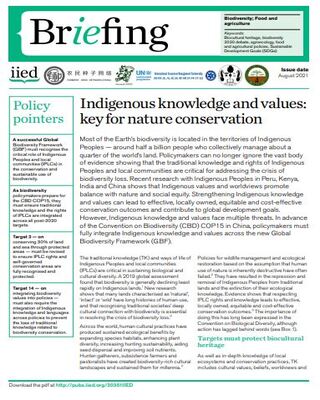
Indigenous knowledge and values: key for nature conservation
Publication Year: 2021
Author(s): Swiderska K, Argumedo A, Song Y, Rastogi A, Gurung N, Wekesa, C, Li G
Abstract:
Most of the Earth’s biodiversity is located in the territories of Indigenous Peoples — around half a billion people who collectively manage about a quarter of the world’s land. Policymakers can no longer ignore the vast body of evidence showing that the traditional knowledge and rights of Indigenous Peoples and local communities are critical for addressing the crisis of biodiversity loss. Recent research with Indigenous Peoples in Peru, Kenya, India and China shows that Indigenous values and worldviews promote balance with nature and social equity. Strengthening Indigenous knowledge and values can lead to effective, locally owned, equitable and cost-effective conservation outcomes and contribute to global development goals. However, Indigenous knowledge and values face multiple threats. In advance of the Convention on Biodiversity (CBD) COP15 in China, policymakers must fully integrate Indigenous knowledge and values across the new Global Biodiversity Framework (GBF).
Source of Publication: International Institute for Environment and Development
Publisher/Organisation: International Institute for Environment and Development
URL:
https://www.iied.org/sites/default/files/pdfs/2021-08/20351IIED.pdf
Theme: Traditional/ Indigenous Knowledge | Subtheme: Livelihoods



